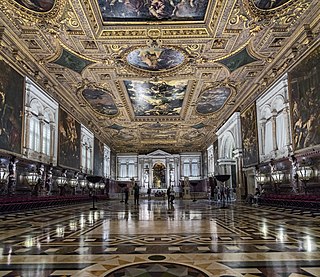Related Research Articles
Gallia, was a region of Western Europe during the Iron Age occupied by present-day France, Belgium and other neighbouring countries.

Robert Eugene Ward was an American composer who is best remembered for his opera The Crucible (1961) after the 1953 play of the same name by Arthur Miller. He was awarded the Pulitzer Prize for Music for that opera in 1962.

Geoffrey Alan Burgon was an English composer best known for his television and film scores. Among his most recognisable works are Monty Python's Life of Brian for film, and Tinker Tailor Soldier Spy and Brideshead Revisited for television, the latter two earning Ivor Novello Awards in 1979 and 1981 respectively. He also won BAFTAs for his themes for the remake of The Forsyte Saga and Longitude.
The Lamentations of Jeremiah the Prophet have been set by various composers.
Robert Spano is an American conductor and pianist. He is currently music director of the Fort Worth Symphony Orchestra, music director of the Aspen Music Festival and School, principal conductor of the Rhode Island Philharmonic Orchestra, and music director laureate of the Atlanta Symphony Orchestra (ASO).

The Funeral Anthem for Queen Caroline, HWV 264, is an anthem by George Frideric Handel. It was composed and first performed for the funeral of Caroline of Ansbach at Westminster Abbey on 17 December 1737. Handel slightly re-worked the anthem and used it for the opening section of his oratorio Israel in Egypt in 1739. The theme of the first chorus was taken by Mozart as the theme for the Requiem aeternam movement of his Requiem Mass. The anthem is approximately forty minutes in length.

The St Luke Passion is a work for chorus and orchestra written in 1966 by Polish composer Krzysztof Penderecki. He composed the work to commemorate a millennium of Polish Christianity following the baptism and conversion of Polish duke Mieszko I in 966 AD. Penderecki's setting is one of several musical settings of the Passion story and contains text from the Gospel of Luke as well as other sources such as the Stabat Mater. Despite the Passion's almost total atonality and use of avant-garde musical techniques, the musical public appreciated the work's stark power and direct emotional impact and the piece was performed several more times soon after its premiere on 30 March 1966.

Mireille is an 1864 opera in five acts by Charles Gounod to a French libretto by Michel Carré after Frédéric Mistral's poem Mirèio. The vocal score is dedicated to George V of Hanover.

Leonard Bernstein's Symphony No. 1 Jeremiah was composed in 1942. Jeremiah is a programmatic work, following the Biblical story of the prophet Jeremiah. The third movement uses texts from the Book of Lamentations in the Hebrew Bible, sung by a mezzo-soprano. The work won the New York Music Critics' Circle Award for the best American work of 1944.

Georgina Weldon was a British litigant and amateur soprano of the Victorian era.
Richard Collins St. Clair is an American composer, pedagogue, poet and pianist.

The Oratorio de Noël, Op. 12, by Camille Saint-Saëns, also known as his Christmas Oratorio, is a cantata-like work scored for soloists, chorus, organ, strings and harp. While an organist at La Madeleine, Saint-Saëns wrote the Christmas oratorio in less than a fortnight, completing it ten days before its premiere on Christmas 1858. The vocal score of this oratorio was prepared later by the composer and organist Eugene Gigout, a colleague of Saint-Saëns.

Threni: id est Lamentationes Jeremiae Prophetae, usually referred to simply as Threni, is a musical setting by Igor Stravinsky of verses from the Book of Lamentations in the Latin of the Vulgate, for solo singers, chorus and orchestra. It is Stravinsky's first and longest completely dodecaphonic work, but is not often performed. It has been called "austere" but also a "culminating point" in his career, "important both spiritually and stylistically" and "the most ambitious and structurally the most complex" of all his religious compositions, and even "among Stravinsky's greatest works".
Leçons de ténèbres is a genre of French Baroque music which developed from the polyphonic lamentations settings for the tenebrae service of Renaissance composers such as Sermisy, Gesualdo, Brumel, Tallis, and Tomás Luis de Victoria into virtuoso solo chamber music.

St. Cecilia Mass is the common name of a solemn mass in G major by Charles Gounod, composed in 1855 and scored for three soloists, mixed choir, orchestra and organ. The official name is Messe solennelle en l’honneur de Sainte-Cécile, in homage of St. Cecilia, the patron saint of music. The work was assigned CG 56 in the catalogue of the composer's works.
Charles Clement Fussell is an American composer and conductor of contemporary classical music. He has composed six symphonies and three operas. His symphony Wilde for solo baritone and orchestra, based on the life of Oscar Wilde and premiered by the Newton Symphony Orchestra and the baritone Sanford Sylvan in 1990, was a finalist for the 1991 Pulitzer Prize for Music. He received a citation and award from the American Academy of Arts and Letters in 1992.
La Rédemption is an oratorio in three parts by Charles Gounod arranged for the first time in 1882.
Tobie is an oratorio by Charles Gounod to words by Lefèvre from 1854.
References
- ↑ Thomas Tallis and His Music in Victorian England -Suzanne Cole - 2008 Page 91 1843833808 In Gounod we have a feminine abandonment to the luxury of weeping; Tallis has tears in plenty, but they are the tears of a strong man who will not let them fall.79 In ... Gounod's Gallia sets essentially the same text as Tallis's Lamentations.
- ↑ Charles Gounod (1871). "Gallia". Novello, Ewer & Co. p. 1.